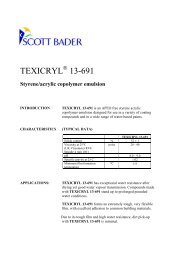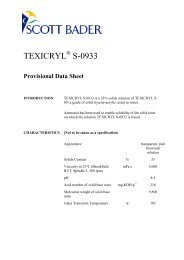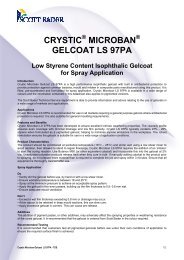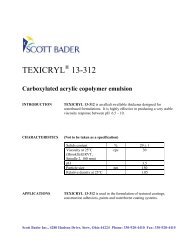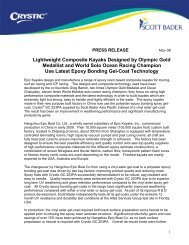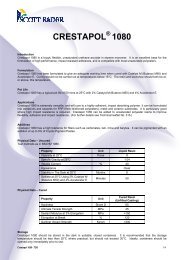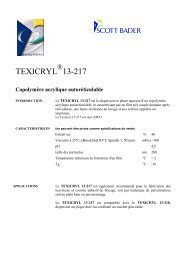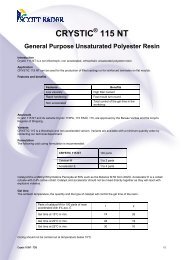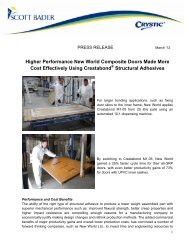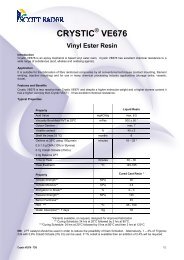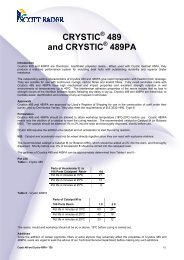Crystic 198 Resin - English - Scott Bader
Crystic 198 Resin - English - Scott Bader
Crystic 198 Resin - English - Scott Bader
You also want an ePaper? Increase the reach of your titles
YUMPU automatically turns print PDFs into web optimized ePapers that Google loves.
CRYSTIC ® <strong>198</strong><br />
Heat and Chemical Resistant Polyester <strong>Resin</strong><br />
Introduction<br />
<strong>Crystic</strong><strong>198</strong> is a medium viscosity orthophthalic polyester resin with good heat and chemical resistant properties. A<br />
thixotropic, pre-accelerated version of this resin is available as <strong>Crystic</strong> 474PA.<br />
Applications<br />
<strong>Crystic</strong> <strong>198</strong> was developed for use in a wide range of applications throughout the chemical industry. It is particularly<br />
suitable for the construction of tanks, pipes and fumestacks to operate in environments where heat and chemical<br />
resistance are both required. <strong>Crystic</strong> <strong>198</strong> is a versatile resin suitable for use in contact moulding and automated<br />
processes such as pultrusion.<br />
Features and Benefits<br />
<strong>Crystic</strong> <strong>198</strong> can be used in conjunction with glass fibre backed polypropylene (Celmar ® ), and suitably treated uPVC, to<br />
produce dimensionally stable composites with high heat and chemical resistance.<br />
Approvals<br />
<strong>Crystic</strong> <strong>198</strong> meets the requirements of BS 3532:1990, for a Type C (heat resistant) polyester resin.<br />
Formulation<br />
<strong>Crystic</strong><strong>198</strong> can be used in both hot and cold curing formulations.<br />
Hot Curing<br />
The recommended catalyst is Catalyst Powder B (or Lucidol CH50) which should be added at 2% into the resin and<br />
thoroughly dispersed. The catalysed mix will remain usable for several days at workshop temperature (18ºC - 20ºC).<br />
Cure should take place between 80ºC and 140ºC, but for most applications 120ºC will be satisfactory.<br />
Cold Curing<br />
<strong>Crystic</strong> <strong>198</strong> should be allowed to attain workshop temperature (18ºC - 20ºC) before use. It requires the addition of a<br />
catalyst and an accelerator to start the curing reaction.<br />
NB Catalyst and accelerator must not be mixed directly together, as they can react with explosive violence.<br />
The recommended catalyst is Catalyst M (or Butanox M50) which should be added at 2% into the resin, and thoroughly<br />
dispersed. The catalysed mix will remain usable at workshop temperature (18ºC - 20ºC) for approximately 8 hours.<br />
Shortly before use, the correct amount of Accelerator E should be stirred into the catalysed resin. The amount of<br />
Accelerator E can be approximately determined from the table below.<br />
Pot Life<br />
Parts of Accelerator E to<br />
100 parts of Catalysed <strong>Resin</strong> 1.0 2.0 3.0 4.0<br />
Pot life in minutes at 15ºC 51 32 24 19<br />
Pot life in minutes at 20ºC 30 20 16 12<br />
Pot life in minutes at 25ºC 19 13 10 7<br />
The resin, mould and workshop should be at, or above, 15ºC before curing is carried out.<br />
Additives<br />
<strong>Crystic</strong> <strong>198</strong> can be pigmented by the addition of up to 5% of <strong>Crystic</strong> Pigment Paste. However, fillers and pigments can<br />
adversely affect the heat and chemical resistance of <strong>Crystic</strong> <strong>198</strong>, and customers should satisfy themselves that the<br />
required properties will be obtained before any large scale use.<br />
When reduced fire hazard laminates are required, up to 20% by weight of <strong>Crystic</strong> <strong>198</strong> can be replaced by <strong>Crystic</strong> Prefil F.<br />
<strong>Crystic</strong> <strong>198</strong> - TDS 1/3
Chemical Resistance<br />
Performance figures for <strong>Crystic</strong> <strong>198</strong> laminates in over 200 chemical environments are contained in the current edition of<br />
our Chemical Containment Brochure.<br />
Post Curing<br />
In order to develop optimum heat and chemical resistance, cold cured <strong>Crystic</strong> <strong>198</strong> laminates must be post cured before<br />
being put into service. Mouldings should be allowed to cure for 24 hours at 20ºC and then be oven cured for 3 hours at<br />
80ºC. Where laminates are to withstand higher service temperatures than 80ºC, a further period of post cure at the<br />
operating temperature should be given. Post curing is not normally necessary for heat cured laminates, provided that the<br />
moulding cycle is adequate.<br />
Typical Properties<br />
The following tables give typical properties of <strong>Crystic</strong> <strong>198</strong> when tested in accordance with BS 2782.<br />
Property<br />
Liquid <strong>Resin</strong><br />
Appearance<br />
Yellowish<br />
Viscosity at 25ºC 37.35 sec -1 poise 5.5<br />
Specific Gravity at 25ºC 1.11<br />
Volatile content % 36<br />
Acid value mg KOH/g 24<br />
Stability at 20ºC months 6<br />
Geltime at 25ºC using 2% Catalyst M,<br />
4% Accelerator E minutes 12<br />
Property<br />
Fully cured* <strong>Resin</strong><br />
(unfilled casting)<br />
Barcol Hardness (Model GYZJ 934-1) 48<br />
Deflection temperature under load † (1.80<br />
ºC 112<br />
MPa)<br />
Water absorption 24 hrs at 23ºC mg 28<br />
Tensile strength MPa 57<br />
Tensile modulus MPa 3700<br />
Elongation at break % 1.8<br />
Specific Gravity at 25ºC 1.22<br />
Volumetric shrinkage % 8.2<br />
*Curing schedule - 24 hrs at 20ºC, 3 hrs at 80ºC<br />
†Curing schedule - 24 hrs at 20ºC, 5 hrs at 80ºC, 3 hrs at 120ºC<br />
Property<br />
CSM **Laminate<br />
Glass content % 28<br />
Tensile strength MPa 74<br />
Tensile modulus MPa 7100<br />
Elongation at break % 1.7<br />
Flexural strength MPa 189<br />
Flexural modulus MPa 7300<br />
** Made with 4 layers 450g/m 2 EB CSM.<br />
Curing schedule 24 hrs at 20ºC, 3 hrs at 80ºC.<br />
<strong>Crystic</strong> <strong>198</strong> - TDS 2/3
Storage<br />
<strong>Crystic</strong> <strong>198</strong> should be stored in the dark in suitable closed containers. It is recommended that the storage temperature<br />
should be less than 20ºC where practical, but should not exceed 30ºC. Ideally, containers should be opened only<br />
immediately prior to use.<br />
Packaging<br />
<strong>Crystic</strong> <strong>198</strong> is supplied in 25kg and 200kg containers. Bulk supplies can be delivered by road tanker.<br />
Health & Safety<br />
Please see separate Material Safety Data Sheet.<br />
Technical Leaflet No. 273<br />
Version 2 : February 2013<br />
All information on this data sheet is based on laboratory testing and is not intended for design purposes. <strong>Scott</strong> <strong>Bader</strong> makes no representations or warranties of any<br />
kind concerning this data. Due to variance of storage, handling and application of these materials, <strong>Scott</strong> <strong>Bader</strong> cannot accept liability for results obtained. The<br />
manufacture of materials is the subject of granted patents and patent applications; freedom to operate patented processes is not implied by this publication.<br />
SCOTT BADER COMPANY LIMITED<br />
Wollaston, Wellingborough, Northamptonshire, NN29 7RL<br />
Telephone: +44 (0) 1933 663100<br />
Facsimile: +44 (0) 1933 666623<br />
www.scottbader.com<br />
<strong>Crystic</strong> <strong>198</strong> - TDS 3/3




